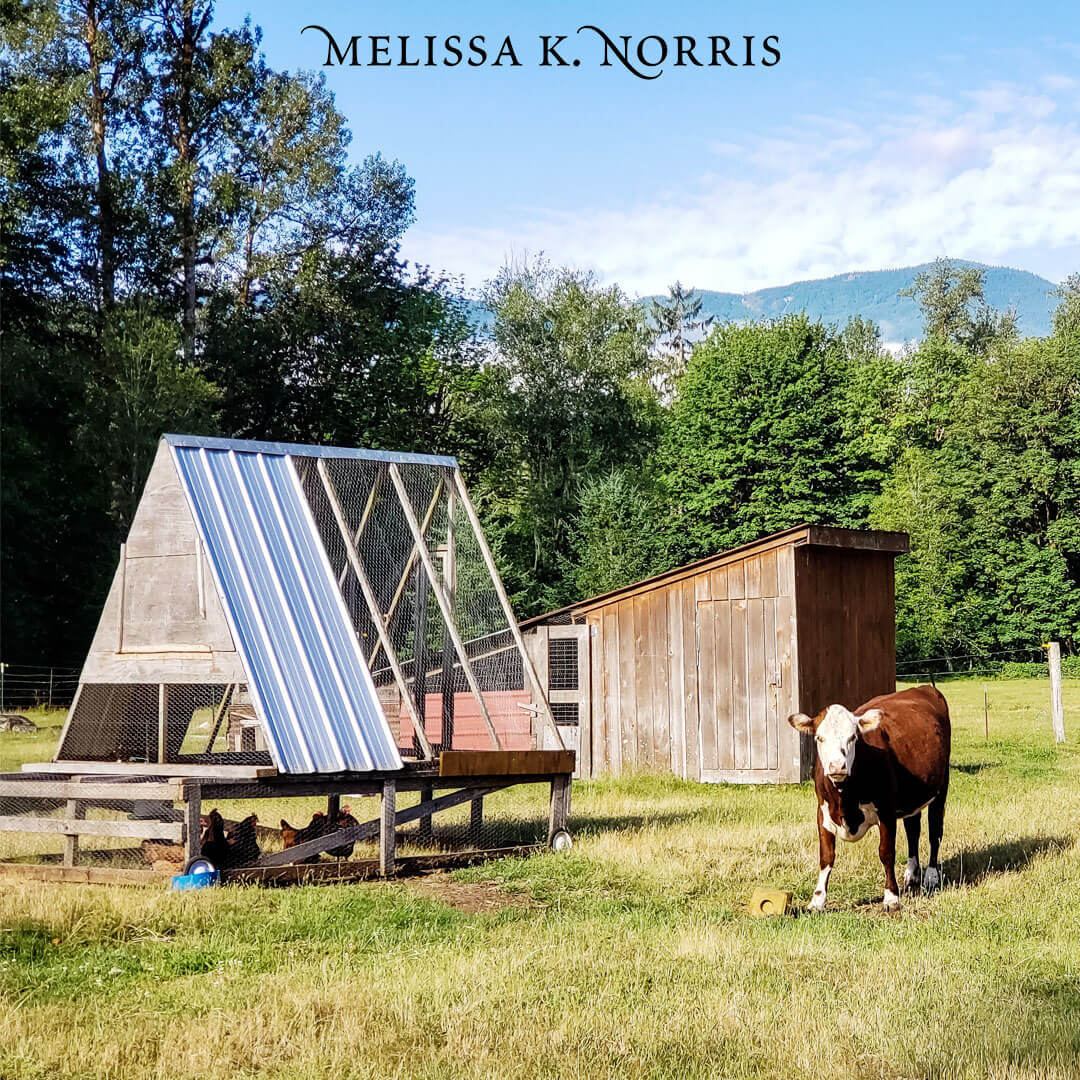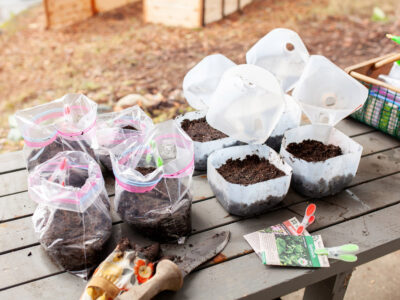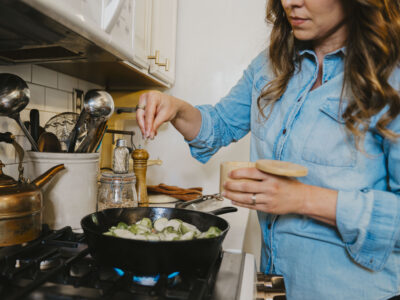One of the most common questions asked when someone is first embarking on their homesteading journey is “How can I earn a living from my homestead?”
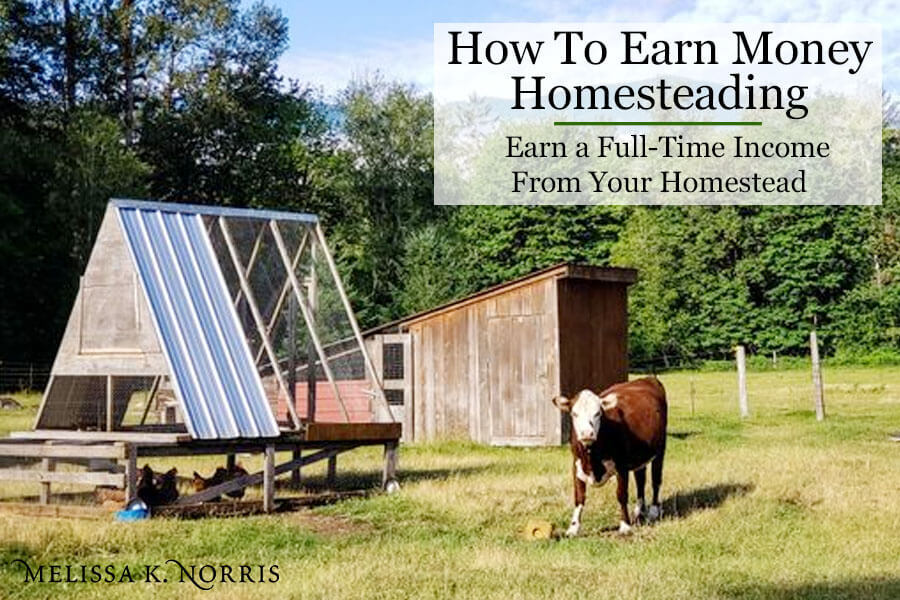
Listen in below to the full podcast, Episode #187 Earning an Income from the Homestead, of the Pioneering Today Podcast, where we don’t just inspire you, but give you the clear steps to create the homegrown garden, pantry, kitchen and life you want for your family and homestead.
There are many variations on how homesteaders bring in an income. Many want the homestead or hobby farm way of life but they still work their regular day jobs outside of the homestead. While some have their sole means directly from the homestead. And then there are those who fall in between the two. That’s where my husband and I fall.
My husband is a sawyer at a guitar mill while I am home doing the podcast, writing books and the website and all of that stuff while also doing the homestead stuff. Now, let me clarify, my husband also does the homestead stuff. Living a homestead life requires all members of the family in some capacity or another.
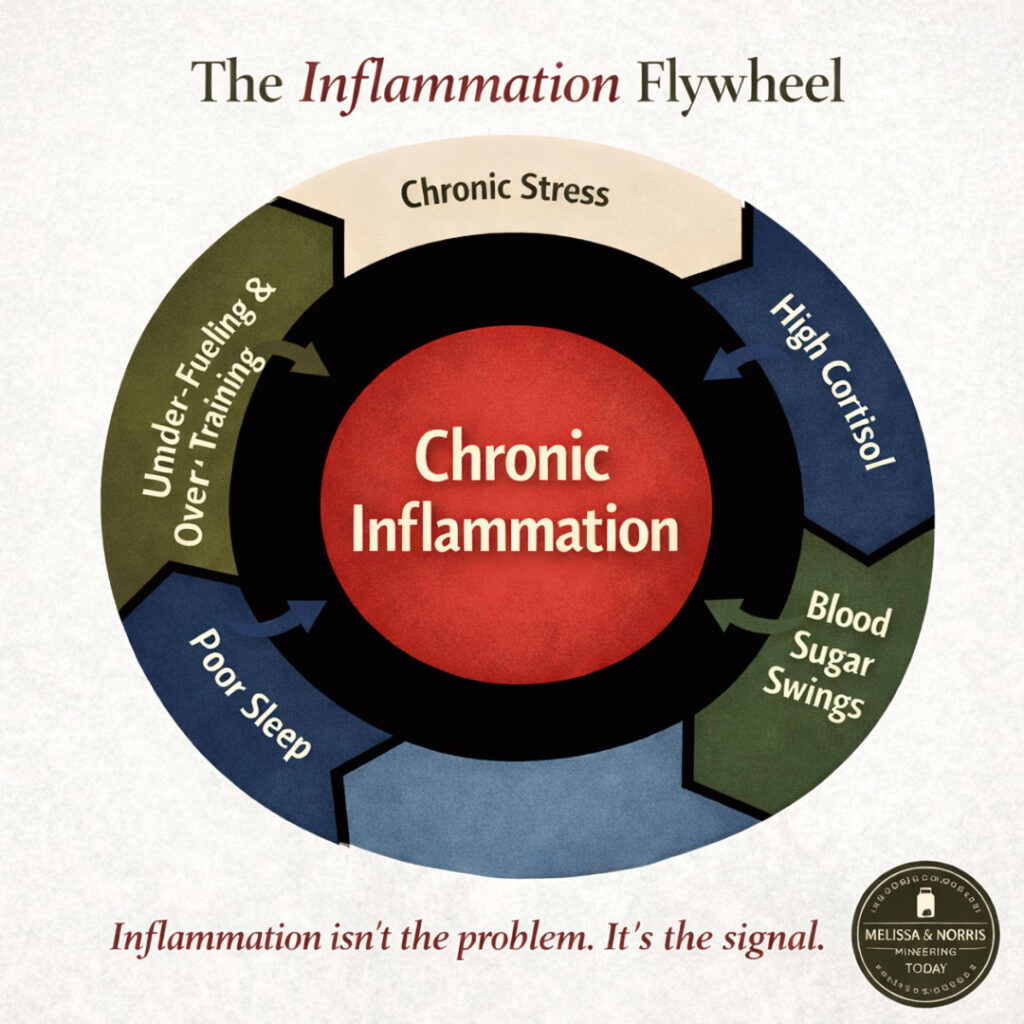
The Hidden Cycle Keeping You Inflamed
If you’ve been feeling puffy, tired, achy, or wired-but-tired, this two-page guide will help you understand what may be happening behind the scenes — even if you’re eating “healthy.”
Download the Inflammation Flywheel Guide and learn:
- Where to start so you don’t feel overwhelmed
- The 5 most common drivers that keep inflammation switched on
- Why blood sugar swings, stress, and poor sleep feed each other
With all that I do, my homestead stuff does bring in an income for us, it’s just a little bit different because I’m an online teacher and educator. I never really thought of it that way before but it fits. Living this lifestyle and being able to teach and share with others, that’s how I bring in my income.
But there are many ways that are a bit more secure and would probably bring in a larger income quicker than doing the online route that I’ve chosen. Today we’re going to be focusing on those other ways of using those homesteading skills and making an income from your land or homestead.
Todd, known as the Sustainable Simple Living Family (SSL Family Dad) Dad, is our guest today. He and his family have the Sustainable Simple Living Farm. The SSL Family Dad is all about doing it yourself and living a more sustainable and healthy lifestyle.
Almost three years ago they gave up the easy life in the suburbs for a down and dirty life on a 25 acre hobby farm. They grow as much of their own food as possible, raise livestock sustainable and naturally and create self-sustaining systems with everything they do. Living there also means fixing, building, and engineering all kinds of things almost daily to meet the needs of the farm.
I’m super excited for today’s interview because this is something you guys have asked me about often. I think it’s going to be very valuable and I’m excited to introduce you to Todd. So Todd, welcome to the Pioneering Today Podcast.
Todd: Thanks for having me on. I’m excited.
Melissa: What I think is fascinating about your story is that just from 2016, you guys started a homestead and a farm, and that is sustaining your family. So can you give us a little history and your story. Then we’ll dive into ways that your farm is bringing in income for you.
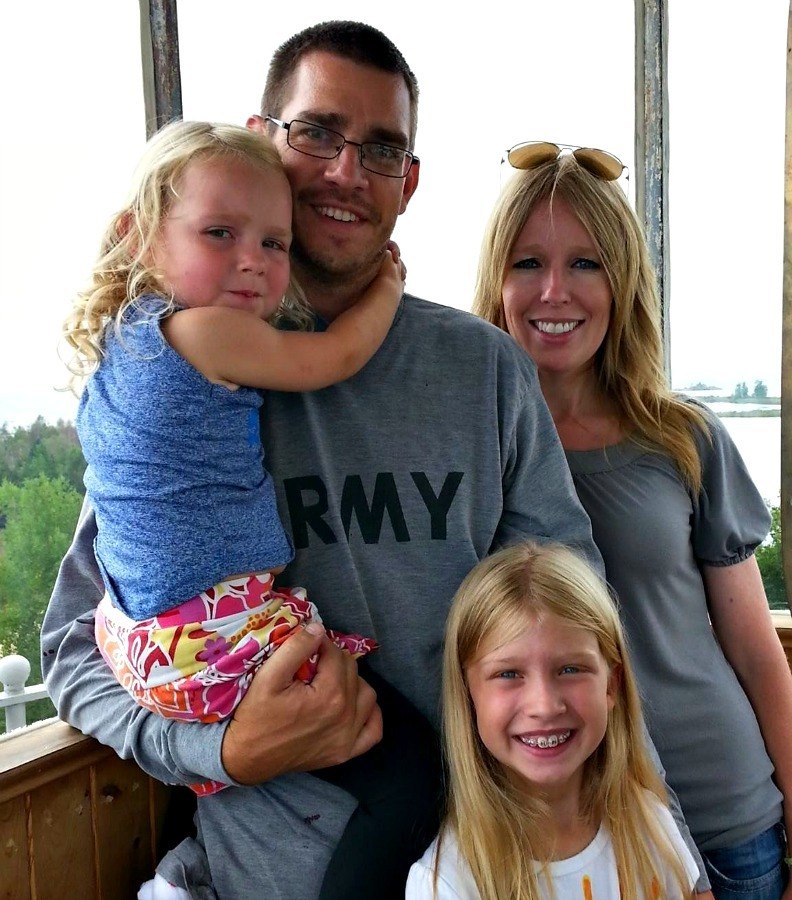
Table of Contents[Hide][Show]
From Suburban Living to Homesteading Income in Three Years
Todd: Absolutely. My wife and I were working full-time jobs and running the rat race of life: kids, school, athletics, all those things in church and everything else. We just decided we wanted to live a more sustainable life. My wife really wanted to have goats and we had just gotten into gardening and growing our how food. My wife had lost her job and that affected her income quite a bit. So we were just trying to do things ourselves and make up that income. That led us out to this farm, this homestead where we are now.
It’s a 25 acre piece of land in the middle of nowhere in a small town. The goal for us is to be 100% sustained, meeting all of our needs for food and money and all those things on this piece of land.
And we’re on the way to that. Over the past three years we’ve certainly learned a lot and that is ever evolving of how we earn income and do all these things. We were suburbanites and I guess we’re not anymore. We’d like to be able to live off the land completely.
Melissa: So you guys had some skill sets already because you said you’d been gardening. So when you came to the property was the 25 acres raw land? Did you have to develop it? Did it already have some infrastructure in place?
Todd: We went from half an acre in our little suburban homestead and we did garden, had square foot gardens, and had other things, but it was pretty minuscule. When we moved out here there was some infrastructure – a pole barn and some pastures that needed a lot of attention – but there were some pastures in place. But our biggest asset that was here when we moved in was the already planted hay fields. There were nine acres of hay fields that was ready to harvest. That was a huge help for us to get started.
Melissa: Let everybody know where you guys are located since we’re talking about hay fields. I know people are gonna ask.
Todd: We’re in mid Michigan between Lansing and the Flint area, which is pretty much the central part of the state. We get a good winter here and a shorter summer, so lots of cold but the summers are pretty decent and lots of rain here so things grow well.
Melissa: I’m in the Pacific northwest on the west side of the Cascades of Washington state so we’re kind of the same way. I’m in gardening zone 6b if you actually look at the plantable days and average temperatures. We get a lot of rain, shorter summers and longer winters but I think your winters are probably a little bit more harsh than ours, but very similar growing conditions.
We have cattle, raise our our organic grass fed beef and do pigs and chickens. But when it comes to hay we don’t actually do our own. My Dad and brothers do hay so w’ere really lucky that we can work with them. How many cuttings do you guys get with your climate then on your hay?
Todd: It really depends on the year. The first year we were here we made some very small investments in some old hay equipment to get us started. We actually got four cuttings that first year that we did hay here. Now the fourth cutting was very, very small but everything worked out well. This year I probably will only get two cuttings. I just got done with the first cutting here. Usually it’s in May and it’s July, so it just depends on the year. Three cuttings is usually the average.
Melissa: We usually get two. We’re lucky if we hit a third mainly because we’re just so wet. So are you guys doing regular square bales? Round bales?
Todd: Oh yeah, w’ere doing the old school square bales. We got a 1955 Oliver Baler and it cranks out the little square bales. For all those who don’t do hay, that’s where all the work is. Round bales are great because you can use the tractor to move them around but square bales gotta be moved by hand usually. So that’s what w’ere doing now. And they’re easy for us to feed various animals in different pastures. We have horses, which they tend to prefer the square bales in many cases.
Melissa: What’s the hay your doing? Alfalfa, Timothy, orchard? What kind of seed mix are you using?
Todd: So the nice thing about these hay fields were planted so I don’t know the exact mix that was in them but there is some Alfalfa, some Timothy, there’s definitely orchard grass. It’s a pretty good mix. I don’t know if there’s broom grass in it or not, but it’s a good self-sustaining mix so it’ll last a decent amount of time before it needs to be replanted. It’s been a good horse hay, which has helped with income for us originally because we could sell it at a decent premium and make a little bit of money off of it.
Melissa: Guys, we’re going to circle around to the income. I got side-tracked by the haying because it’s something that we do and I’m always really curious.
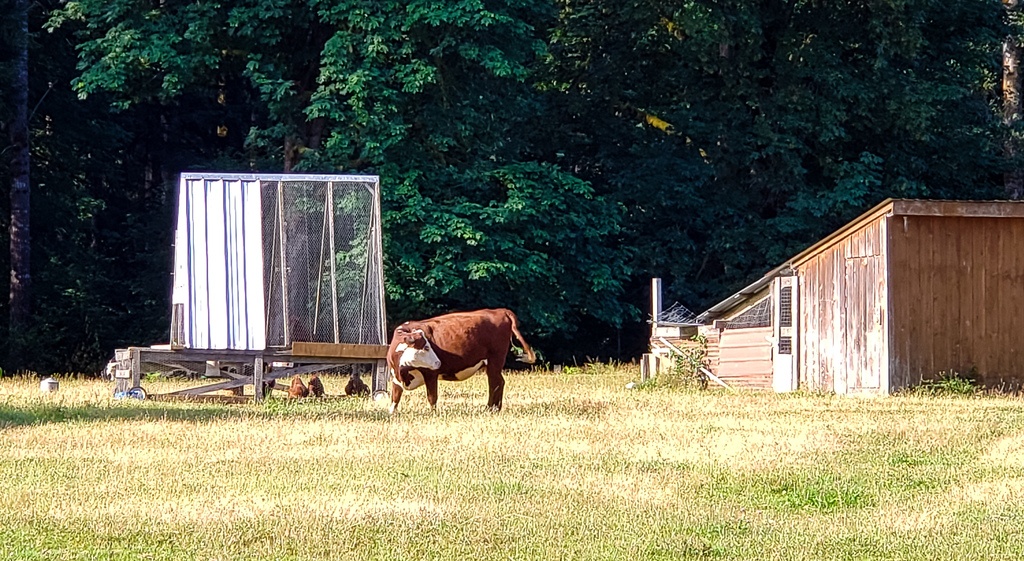
I don’t have horses now but I used to do horses – amateur barrel race and train and breakout horses and that is generally the way it goes for horse hay. I paid top dollar for good horse hay and it was always square bales. As far as a cash crop, having it seeded and being able to sell it as horse hay is going to definitely bring in a larger income, generally speaking.
Using the Land to Pay for Your Own Livestock
So let’s dive into that. Talking about making an income from your farm and from your property and having it help pay for itself. So with the hay field already being done you could jump in and get that cutting so it sounds like haying is on way that you bring in income. What are some of the other ways that the farm and homestead brings in income?
Todd: Yeah, having those hay fields was a huge boost for us because our whole idea of simple, sustainable living is kind of the catch phrase or name of what we do. We want everything to be kind of self-supporting and self sustaining and that all starts with those hay fields.
Generally we sell off enough of the hay that we harvest to cover all of our costs for fuel, tractor maintenance and equipment and all those things. We sell off maybe a few hundred bales and it covers all the costs that we have for that hay other than time. The rest of the hay that we have left is free feed for our animals. We have a pasture breed of pig that eats a lot of hay throughout the wintertime. The horses were a rescue so they’re not really part of our sustainable operation yet. They’re just giant hungry pets.
But we have goats – these Nigerian dwarf goats, which we milk and also sell off as another income source. They’re a very popular pet breed so we sell the goat kids for a pretty good price. We also have our pigs which are a registered breed – American Guinea hogs. They sell for a pretty good price as well. But all that starts with those hay fields and it really allows us to make a higher profit margin off those animals because we don’t have to buy hay and buy as much feed for them.
Melissa: That’s so true because our biggest expense is the feed for the animals. Usually the end of April through September they’re totally grass fed just on pasture but then we have to start supplementing with hay in those other months.
If the hay you’re selling is basically paying for all your expenses they your profit on your livestock is so much more. Kudos to you guys! That’s awesome that you’re able to do that.
You’re using your animals too, at least some of them. There’s two ways that you can use your livestock on a homestead to make a profit. One way is to tell it for meat. So if they’re meat animals you can sell, especially with cattle, you can sell it as a whole beef, half, even down to a quarter, but then you can also breed them. Then of course, your selling off the young ones. You guys were doing that with the goats and it sounds like pigs too. Then you also have a milk animal where you can sell the milk or maybe taking the milk and making it into different things and selling that.
There’s multiple ways to make income off of livestock and I think when you’re new to homesteading and farming, it’s really good to sit and look at what’s going to be the most profitable for you now. For us we have to pay for our hay but fortunately, because we’ve got family sources, we get the family discount. So if we were to sell off the calves, the litters like piglets and such, for us that’s not as profitable because we’re putting way more out in feed. With cattle we would have to keep a bull and, like a horse, they’re going to eat a whole lot more. Because of that we don’t do the selling, we just have the meat.
That’s definitely something to think about full circle: your costs versus how much you’re going to be bringing home profit wise. Cause sometimes you might be getting paid a lot for that animal but if you’ve got high feed costs it’s really not going to work out.
Being Smarter About Your Farming for Income
Todd: Yeah, and the way that we’re doing things, sounds like some of what you’re doing, is not really traditional farming. Traditional farming for pigs for instance, I’m going to go out and buy 10, 20, 30 feeder pigs at the beginning of the year from someone else. Then I’ll raise them out for a few months, heavy grain feed and get them as big as possible and then take them to market and sell them off.
That’s just not how we wanted to raise those animals so we have to overwinter them because we’re breeding them. We have to keep a boar or two. We have to keep a couple sows that we have to feed through the wintertime. But the idea with the pigs is that those piglets will cover all of the feed costs for the year. So we get meat out of the deal, we sell off the pigs for some extra money – covers all our feed costs – and then it helps feed us for the year too.
Multiple ways to make money and save money because harvesting your own meat is going to save you a lot of money by having food for the family.
Melissa: Yeah, definitely. Sometimes your actually breaking even but then you have all your meat, and in your case, the hay covering all your hay costs. So sometimes your not making a profit monetarily wise. But if you were to put out money to buy that same meat, and I have to stress the quality of the meat because we don’t do grain fed, nor do we give our animals GMO feed, it’s so worth it when you compare that to buying it in the store.
If you’re thinking about livestock as well you can also do artificial insemination but that’s a whole other ball game. I don’t have personal experience in that one so I’m not going to talk to it, bit it is an option. We’re able to breed our cows back every year by rotating through. My brother has a bull, my Dad has a bull, and we have a neighbor that has a bull and they love it because they can send their bull to our house and we’re feeding it during the breeding time and they don’t have that expense. Some people will charge you a fee to take the bull, but my sources don’t because we’re feeding him for a couple months and he’s at our house.
Todd: Well that’s a really great way to do it because that, especially when you’re starting off small, that is one of the hugest expenses is keeping a boar. You have to keep that boar or bull or ram all year round and they really just have a job for a couple weeks out of the year. That’s a huge expense.
Melissa: Yeah, and on the flip side, if you do have a boar, I would say too, when you let your animals go anywhere or you’re bringing an animal in, you want to make sure it’s from somebody that you totally trust that you know the animal isn’t carrying any disease. I mean, there’s a whole litany of things there.
That could be something that you would look at and it would reduce your feed costs or you might even charge a cover fee in order for someone to use your boar or bull for breeding for a few months. if you do you end up keeping one. There are way that you can monetize that or cut your costs too bu letting it go out.
Okay, we’ve covered the hay and livestock. Do you guys have any other ways that your homestead farm is bringing in income and helping to pay for itself?
Make Homesteading Pay by Reducing Living Costs and Keeping Expenses Down
Todd: The two things that I always talk about on our YouTube channel for people that are starting out with homesteading and farming or whatever you want to do, you really have two things that you need to do. You need to reduce your living costs and your expenses way down.
One of the ways that we support ourselves, kind of like you said, it might not be making money but because we have whole chickens and we have pork and we have vegetables and we have a whole lot of our own food that we produce here for next to nothing. That reduces our living expenses. We don’t have to produce as much money. Outside of just selling off the livestock and hay and sometimes pumpkins or vegetables or other things I also do side work off and on as a self employment thing for computer repair. That’s just the job, skills that I had so I use them to fill in the gaps along the way. I do a lot of computer work for friends and family, neighbors, and local businesses and things like that which helps to fill in the gaps when we’re not making extra money.
We also do maple syrup. That’s another big one. Maple syrup is probably going to end up being one of our major sources of income and one of our focuses here because we just love it.
Melissa: Oh awesome. So obviously you guys have some maple trees to tap if you’re doing maple syrup. So how many acres or how many trees do you have that you’re tapping from?
Todd: We don’t have that much forest here, but strangely, maple syrup has always been one of the things I’ve been interested in doing, and praise God, when we moved out here, we had the hay fields and we also had this huge stand of maple trees. Pretty much the entire forest we have, which is just a few acres, is maples. It’s not an older forest so there’s probably about a hundred trees in there. We’ve just about maxed out on what we can tap here on our property. We’re going to start looking at neighbor’s properties and other stands of trees around here as well. But we have that as a huge resource and it produces quite a bit of maple syrup for us.
Melissa: That is awesome. We don’t have the sugar maples. We have a few maples here and I’ve tried tapping our alder but we don’t typically get a long enough stretch for the sap to run here. Plus you just don’t get as much sap off of those trees so I haven’t ever collected enough to make my own syrup. I’ll try not to be jealous.
Todd: We’ll have to send you a bottle of SSL Family Farm syrup.
Melissa: Oh that would be awesome! I would love it!
I’ve thought about planting sugar maples, but then, I look at the time needed. You put them in, by the time they’d be large enough to tap, I’m not sure it would be the best use of the property.
Todd: Yeah, in 20 years you have some syrup there maybe.
Melissa: Right.
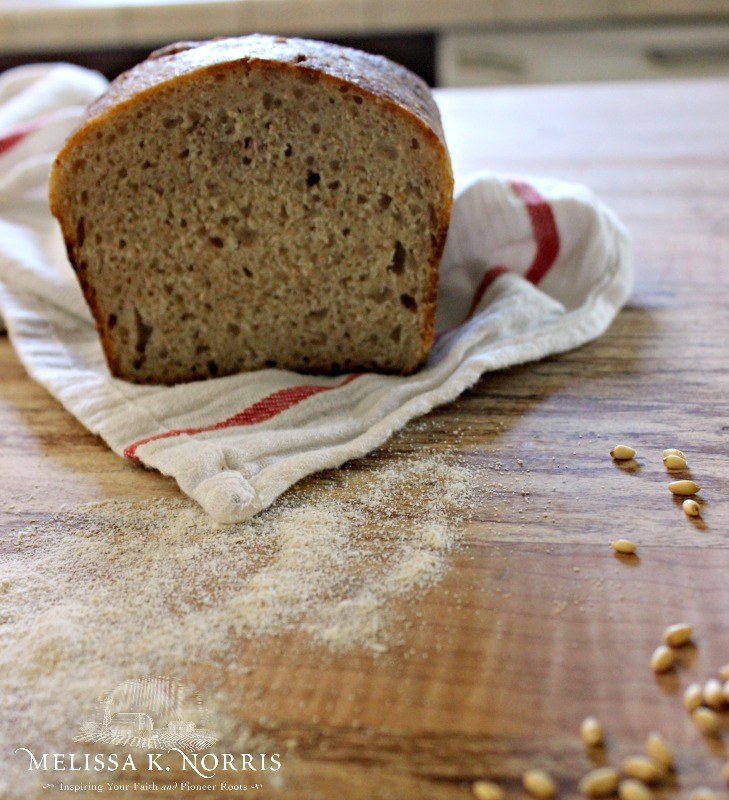
Todd: We don’t have a lot of sugar maples either. We have mostly silver maples and a lot of red maples and a few sugar maples. So although there’s a sugar content difference they all produce great syrup for us. We just have to work a little extra hard to get the syrup out.
Start Now on Creating Income from Homesteading Skills
Melissa: I want to circle back to a couple things that you mentioned and really kind of highlight and dig into those a little bit. With the homesteading and making it self sustainable, like you said, is cutting back expenses. So even if you’re at a spot where you’re not really ready to go and purchase, or you don’t have the acreage where you can’t really do a whole bunch of livestock or really run a farm you can definitely start taking those steps where you are producing what you can with where you’re at right now. That’s going to get you into the practice and allow you to save more money to then hopefully move and purchase livestock or get onto a larger piece of property where you can do more self sufficient things. Because having acreage, and there’s a lot you can do on a small acreage, but if you’re going to be doing livestock and some of these bigger things, especially the larger livestock, you are going to need more acreage and pasture space.
I think sometimes people get trapped into thinking, “I can’t do that right now” and so they don’t start taking those baby steps or doing what they can with where they’re at right now. I think it’s really important in cutting back those expenses, especially if you are gardening and preserving some food you are saving that amount of money. Instead of spending that money, put it aside in a dedicated fund or focus on paying off debts – getting them paid down to be debt-free.
I love that you brought up the fact that you still do some side jobs and do some different things with the skill set that you have.
I think that we sometimes have this dream, especially homesteaders, of living completely off-grid, not being reliant on anything, producing your own food. But the reality is that even back in the day of Pa Ingalls, Laura Ingalls and such, Pa went and did side jobs. He would barter and do different things. My grandparents did the same thing. My grandpa worked in the woods even though they produced pretty much all their own food. He did this because they needed to bring in money and stuff. I say this because I don’t want anybody to fee like, they just couldn’t do it. It’s really normal do do the side jobs and supplement. Don’t feel like it has to be one or the other.
I’m glad you brought that fact up.
Todd: Yup, there are so many ways to reduce your expenses. Really, for people that are watching YouTube and watching all these homesteaders and wanting to live that life, wanting to be off-grid or be more sustainable, there’s no reason you can’t start right where you’re at in your apartment. You can start doing things yourself.
My wife lost her job and our income was cut more than in half and we had to figure it out. We started to do things ourselves. When the car broke I started looking things up on YouTube. We needed to do a project in the house, improve the value of our home or something like that I’m not going to hire all those things out. With YouTube and the internet there’s no reason why we can’t learn to do just about anything and do those things ourselves. It saves an enormous amount of money and prepares you for this lifestyle. I can’t call a mechanic every time my tractor breaks. You can start wherever you are in life and learning and doing those things yourself.
Melissa: Yes, I totally agree. It’s funny because we just purchased a used Ford tractor at an auction this past fall. We had been saving forever because we try to buy things as we have the cash or as we can afford them to avoid putting things on credit cards or getting loans or things of that nature.
If you’ve ever looked at tractors, they are way more spendy than you would think. When you start looking at balers and all of that stuff, it’s not cheap. They are working pieces of machinery and they totally break down. Obviously we were buying an older tractor and my husband, who has never worked on tractors before – luckily my Dad has, but between my Dad and YouTube we did a lot of the repair work. It’s worked great and has been really good for us.
Now, when putting up food, which even if you don’t have the space for a huge garden, you can get things in season by going to a U-pick farm or even get a really good deal at the grocery store and preserve that. A couple years ago my husband had to go on restricted hours so he lost a full eight hours every week. Wasn’t as much as your wife losing her job but it definitely put a pinch on us, but because we had all of that food put up I just “shopped” more from our pantry. I made sure that our meals were done from our preserved food where normally I might have have supplemented a bit more from the grocery store so we didn’t really notice that we had that income loss.
I feel like it’s an insurance and those skill sets will totally pays off down the road if you start implementing now.
Todd: It does. It also allows you to exchange services. I have a friend who’s a mechanic and he’s worked on all kinds of tractors and other things and if I run into a problem that I can’t fix or that’s too big for me, I don’t have the equipment or the tools I can call on him. I have done some computer work for him. If I call him, “Hey man, can you come help me with the tractor problem I’m having?” he’ll come over and help me with that. That way I can use the skill sets that I have to help him out and he uses his to help me out. That kind of thing happens a whole lot more than I thought it would.
There are a lot of things that I run into that I just can’t do. Learning how to do something is one thing, but having a hoist to lift an engine out of a car or something like that, I just can’t do because I don’t have the equipment. So like you said, using your skills to barter and trade, do favors for one another. That helps out a lot.
Melissa: Yeah, it does. I am a huge fan of bartering and trading services. In fact, just thins weekend we bartered firewood for my brother’s (I’m one of 10 so I have a lot of brothers) mechanics services. So, even if it’s within family, we often do bartering and stuff like that back and forth. It’s just such a great thing to have. If you’ve got skill sets put ’em out there and don’t be afraid to offer to barter with somebody. If they say no, then they say no. Then you can start talking about money. But I always say to offer up the bartering option first and see if you can make it beneficial for both parties. A lot of people are really open to it.
Is there anything, if you were looking back, that had you known you’d do differently?
Todd: How much time do we have? Cause I have a lot. Here’s the thing though, all the things I wish I would’ve done differently, wish I would have started with this, wish we had done more of this or less of this…every person is different, every homestead is different and the things I wish I would’ve done differently, I had to learn that.
I had to just dive in. We tried a lot of things. We’re currently getting out of the pig business that just wasn’t a fit for us with the other animals that we have. We’re going to move more into sheep breeding because they’re more of a dual, or triple, purpose animal.
I couldn’t have told you, don’t do pigs because they’ve been great for us too in many ways. I think no matter what, when you get out to your homestead there’s a lot of research and planning and preparation you need to do. Don’t be hesitant to just try things.
We tried selling pumpkins and that wasn’t a hug win for us. So we’re going to try something different this year and every year that evolves. We will try different things and see what works and what doesn’t. We found maple syrup to be awesome for us. So now we know we can focus and invest more in that. It sells quickly. It’s only heavy labor for a few months out of the year. It’s definitely something that we have the resources for so that’s a win for us.
I couldn’t have told you that two or three years ago. So really, you just have to try things and see what works for you, what works for your property, what works for your climate and what works for your community. Know who’s going to buy these things. I thought pumpkins would be a huge hit, thought they’d sell quickly…I think we made $70. They just didn’t sell because there’s so many other people selling pumpkins around here. I might try Christmas trees down the road. It’s a bit of a longer term investment.
Any advice I could give somebody is just to try things that your passionate about, that you like to do and see what works. Some things aren’t going to work and you need to be prepared for that. And that’s okay.
Melissa: Yeah, I think that’s great advice and I’m glad you brought that up. I think the biggest key qualities is having determination. But along with determination is not being too bullheaded and having the ability to say, “okay, this isn’t working how can we pivot.” Not give up but how can we change things to make it work? I know myself and there have been times where I’ve hung onto something because this is the way that you’re supposed to do this even though it’s not working for us.
So I love that you brought that up and it’s so true because some things work really great in some gardens and in some climates or on some homesteads or for their family dynamic but it might not work for you. There’s that school of experience. I think it’s good to do your research and take tips from people who’ve done this before, but you still have to do it and decide if it works for your situation.
Todd: Yeah, absolutely. Everyone’s going to be different and every community is different too. Like the whole pumpkin thing, there were three or four other farms within a couple mils from us that had pumpkin stands and I just hadn’t paid attention to that. It wasn’t a good thing for me to pursue. I could have been bullheaded and try that every year but it’s probably not gonna do any better so I just have to let it go. I had really wanted to do that, it was a passion I had. I love that time of year and all those things, but if that’s not making money then I can’t do it. We have to chase what’s going to be profitable for us. The goats and maple syrup are a more profitable thing so we’ll continue to do more of that.
How to Make Money Homesteading with Goats
Melissa: Awesome. So how many goats do you have? Out of curiosity, what’s your program with the goats?
Todd: I don’t actually know how many goats we have right now. About 20-25, somewhere in there. That’s something we’d like to expand on a bit too, because they sell quickest. Our pigs sometimes sell quick, sometimes not, but the goats seem to sell really quickly. We put them up on Craigslist or Facebook Marketplace, or through our YouTube channel and they go pretty fast.
We have Nigerian dwarf goats, they’re cute little goats. They are good milk goats too but you’re not going to get a lot out of them. You won’t get five gallons of milk, it’s more like a quart or two.
Melissa: I’ve never raised goats so I don’t really know, what’s the gestation period of a goat? Or how many times a year can you breed them?
Todd: Goats are about five months and you can breed them twice if you really want to push it but that’s not really good for the mothers. We try to do just once a year, a spring birth. That’s what everyone’s looking for. We’ll put the moms out on pasture, we’ll milk them for a little while and just let them do their thing for the rest of the year.
We don’t feed our goats year round. Just like the grass fed beef, we put them out onto pasture in the summertime and they do their thing when the leaves and grass and all the things they eat die back we start feeding them hay. They’re very inexpensive to keep that way. They do get some sweet feed grain in the winter time.
Melissa: Since I don’t have any experience with goats I just don’t know. Do they typically have one kid or how many does a mom have with their pregnancy?
Todd: Most resources will say that goats will have two most of the time and very rarely three. But we’ve had some insane two years with one or two goats giving birth to five which is almost almost unheard of. A couple times we’ve had four also, but the majority of the time we get three and sometimes two. I don’t know if it’s just the genetics or what.
Financially speaking, you have one goat doe that gives birth to five babies and three of them are girls then they’re $200 each. So that’s $600 just on those three. The male sell for $100-$150. So you could make $1,000 off that which is good.
Melissa: That’s awesome. Well we might be looking at goats again. When we first purchased our property, which was totally raw, we had to put in a well powerhouse and everything. It didn’t have anything on it; it was just wild. A cousin of ours had a couple goats and she asked if we wanted them to help clear our property. Which we did, especially to get the blackberry vines down. Which they did eat back the vines but it didn’t actually kill them but it did help them from spreading. They were older goats and a lot more trouble since there was no profit coming out of them. I feel like I’m a little bit goat prejudice which I think I need to get over and look at getting the right kind of goat.
Todd: Yeah, goats can be tricky. They like to escape but they do eat all of the strangest things out of your pasture that your cows and horses will not eat. Such as poison ivy, so that’s a good thing.
Melissa: That is a good thing. Keeping the pasture where you have good grass and without the bad weeds and all that noxious stuff…do they eat thistles?
Todd: They eat thistles. I don’t know how but they’ll eat pine needles, thistles…they eat the pokiest strangest things and they love it.
Melissa: Okay. Well I may be rethinking things and this will be the seed if it happens. You know it started here.
Thistles drive us crazy. Before the thistle starts to go to seed we, including our kids, who have been taught good safety, will go out for half an hour ans whack every single this we can find so that we can at least keep them from spreading. But it sounds like goats would be great for that.
Thank you so much for coming on. This has been a fun episode with great information. Where can people go to find out more about you and see some of the things that you are doing?
Todd: The most common place you’ll find us is our YouTube channel. It’s SSL Family Dad. We also have an SSL Family Mom and SSL Family Kids. Each of the family members have a YouTube channel. SSL stands for sustainable simple living. It used to stand for simple suburban living but we had to change it when we moved out here. We also have our website which is sslfamilyfarm.com where we have all kinds of things posted.
Melissa: On the YouTube channel do you do tutorials, that type of thing?
Todd: My YouTube channel is just about everything. Anything we’re doing here: DIY projects, tutorials, how to use farming stuff, gardening stuff, anything that’s going on here, I try to videotape it.
Melissa: Awesome. Well thank you so much. Like I said, I really enjoyed this. You gave us a lot of info and I look forward to seeing what you guys keep on doing.
Todd: Thanks for having us on. I appreciate it.
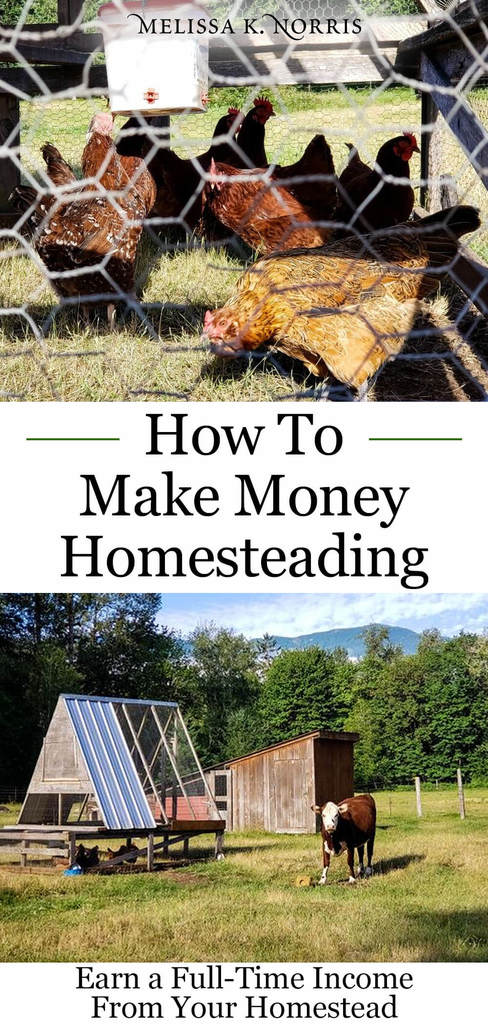
I hope you enjoyed that as much as I did and that you got some great ideas for things that you can do to create an income or to barter and support yourself and your family.
More Homesteading Articles
- Does Homesteading Really Save Money?
- What To Do FIRST On Your Homestead (Or What To Do NEXT)
- Homesteading + Making Money (How to do it All)
- How to Get Everything Done in a Day Without Wasting Time or Getting Distracted
- How to Prepare Your Homestead for Selling
- The Norris Farmstead: Our 40-Acre Homestead Farm-Stay
